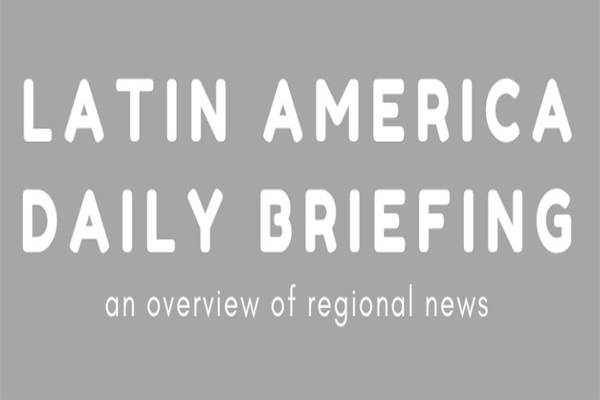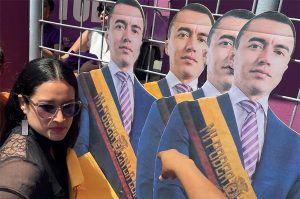
The U.S. Biden administration has slightly eased restrictions on Chevron’s ability to negotiate with Venezuela’s government. Senior administration officials said the move was intended to support talks between the government of President Nicolás Maduro and the U.S.-backed opposition, reports the Washington Post.
Senior U.S. officials said resumption of the negotiations were expected to be announced by Venezuelan officials late yesterday, reports the New York Times. The chairs of the negotiating teams for the Maduro government and the opposition Unitary Platform met yesterday, and tweeted about “rescuing the spirit of Mexico,” in reference to talks suspended last year. (Twitter)
The U.S. Treasury Department license for Chevron, the main U.S. oil company with assets in Venezuela, is the first in what could be a series of steps toward oil sanctions relief, depending on the Maduro government’s cooperation, according to officials. Additionally, Carlos Erik Malpica-Flores — a former high-ranking PDVSA official and nephew of Venezuela’s first lady — will be removed from a list of sanctioned individuals, reports the Associated Press.
Delcy Rodríguez, a top senior Maduro administration official implied in a Twitter post that the sanction deal was broader than what was announced by the White House, and would allow foreign oil companies to restart operations in Venezuela.
It remains unclear whether the U.S.’s limited allowances will be enough to entice Maduro to offer meaningful political concessions to the opposition, notes NYT. Further sanctions relief would be tied to progress at the talks in Mexico City, reports the Miami Herald.
U.S. officials told reporters the tiny concessions were made at the request of the opposition Unitary Platform. For example, McClatchy reports that a senior U.S. official said “It is very important to stress that this was done in coordination with the interim president, Juan Guaidó, to move the talks forward. But the coalition denied the reports yesterday. (Efecto Cocuyo) The opposition said the request came directly from Maduro, reports the New York Times.
U.S. officials were emphatic yesterday that the phased plan leaves the sanctions regime against Maduro in place — an attempt to placate critics who include U.S. lawmakers from both parties who are opposed to any deal with Maduro.
The move, along with Monday’s decision to ease certain sanctions against Cuba (see yesterday’s post), come as the U.S. Biden administration “is trying to take advantage of a closing window of opportunity in Latin America before midterm elections in November,” and as Latin America shifts leftward, leaving the U.S. isolated in its approach to Venezuela and Cuba, reports the Washington Post.
Already the Biden administration is facing significant pushback in the region regarding the possible exclusion of Venezuela, Cuba and Nicaragua from the upcoming Summit of the Americas. (See May 12’s post, for example.) “Countries across the hemisphere are looking for ways to respond to the Venezuelan crisis that matches the reality on the ground, which is that Maduro retains de facto control of the territory,” WOLA Venezuela analyst Geoff Ramsey told the WaPo.
More Venezuela
- Several international airlines are looking at restarting flights to Caracas, which has been significantly isolated in recent years, reports El País.
—————————————————————————————————
MS-13 confessed responsibility for March killings, response to breakdown of gov’t negotiations
Extracts from El Faro’s exclusive investigation.
High-ranking Mara Salvatrucha-13 (MS-13) sources confessed to El Faro their responsibility for the killings of 87 people between March 25 and 27 in El Salvador, including 62 of them on March 26, the most violent day in the past two decades. MS-13 spokespersons revealed that the murders were carried out in response to what they call a “betrayal” by President Nayib Bukele’s administration of the covert pact that reduced homicides since 2019.
As proof of their dialogue with the Bukele administration, MS-13 provided El Faro with seven audio files in which Carlos Marroquín, one of the negotiators on behalf of the president, speaks with at least one member of the gang during and after the violent weekend in March. In the recordings, Marroquín, the administration’s Director for the Reconstruction of Social Fabric, details to his MS-13 counterparts his efforts during the spike in homicides to convince Bukele to keep the agreement alive.
The recordings detail how the killings in late March were the way the Mara Salvatrucha exerted pressure on the government after its members’ arrests, explains El Faro.
In the six weeks following the spike in violence and the souring of the agreement between the Bukele administration and the gangs, authorities claim to have made over 31,000 arrests and the press has registered at least 11 in-custody deaths. Human rights groups have reported widespread arbitrary detentions and Bukele announced he would severely ration and limit prison meals.
In one of the later recording Marroquín says: “Inside they’re torturing people, right? They’re suffering and being humiliated. They’re treating them like animals, and that’s not what we’ve been fighting for. We did it to generate better conditions for those inside and for the people on the street, the communities, the poorest people. Right now all I know, brother, from what they told me, is that it’s going to get worse in the communities. So yeah, put people on alert, brother, because things are going to get even more fucked.”
Ruling party legislators have called for a second 30-day extension of the emergency measures, currently set to expire on May 27.
News Briefs
Migration
- A UK deportation flight to Jamaica took off today with seven people onboard. Home Office deportation flights to Jamaica are among the most contentious carried out by the department, reports the Guardian, as many of those earmarked for removal have Windrush connections or have been in the UK since childhood, with children and other close relatives in the country.
Regional
- This year is likely to be the seventh consecutive above-average Atlantic hurricane season. (Severe Weather Europe)
- Early investigations and intelligence indicate that the Mexico’s Cartel Jalisco Nueva Generación is striking partnerships with drug rings in Guatemala – active on the Pacific Coast and the western border with Mexico – that receive shipments of cocaine from Colombia and Venezuela and deliver them to the cartel, reports InSight Crime.
Mexico
- Mexican farmers have travelled to London to demand that mining company Fresnillo compensate them for illegal mining on their land and explain violence against anti-mining activists. (Guardian)
Peru
- A government proposal for Peru to purchase all the country’s coca production has generated fierce debate, but experts question whether it is even feasible, reports InSight Crime.
Arts
- “Graphic Turn: Like the Ivy on a Wall” at Madrid’s Reina Sofía explores how graphic art – whether on walls, posters, prints, flyers or fabric – has been used to confront political repression and demand social justice in Latin America and beyond over the past 50 years. (Guardian)
Latin America Daily Briefing —
http://latinamericadailybriefing.blogspot.com

 Let’s celebrate the strength, courage and incredible contributions of women around the world. https://www.EnergiesNet.com Portal of Latin America and the Caribbean with news and information on Energy, Oil, Gas, Renewables, Engineering, Technology and Environment
Let’s celebrate the strength, courage and incredible contributions of women around the world. https://www.EnergiesNet.com Portal of Latin America and the Caribbean with news and information on Energy, Oil, Gas, Renewables, Engineering, Technology and Environment








